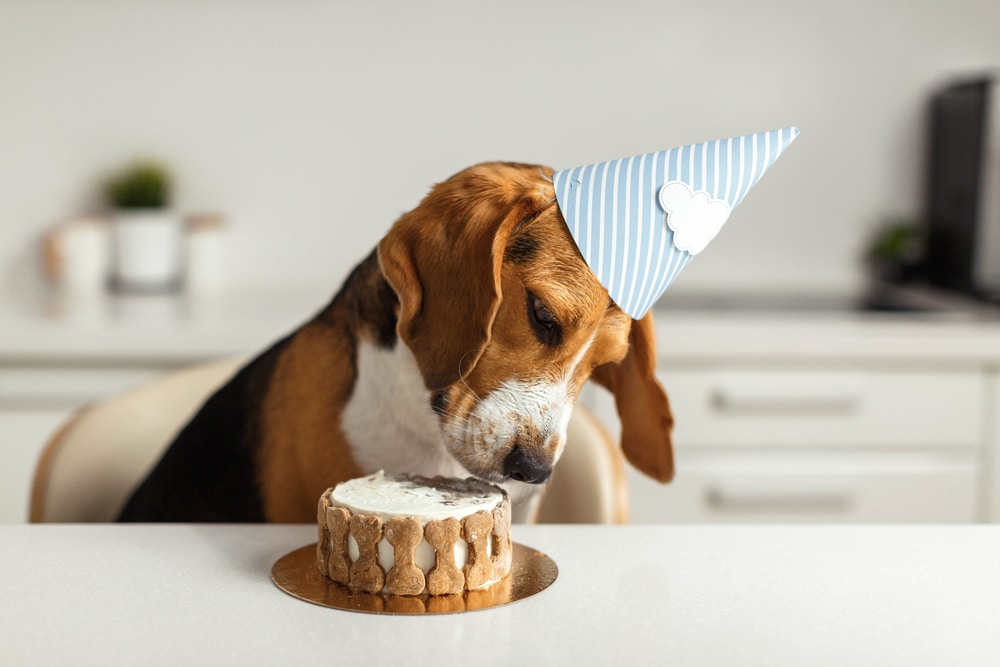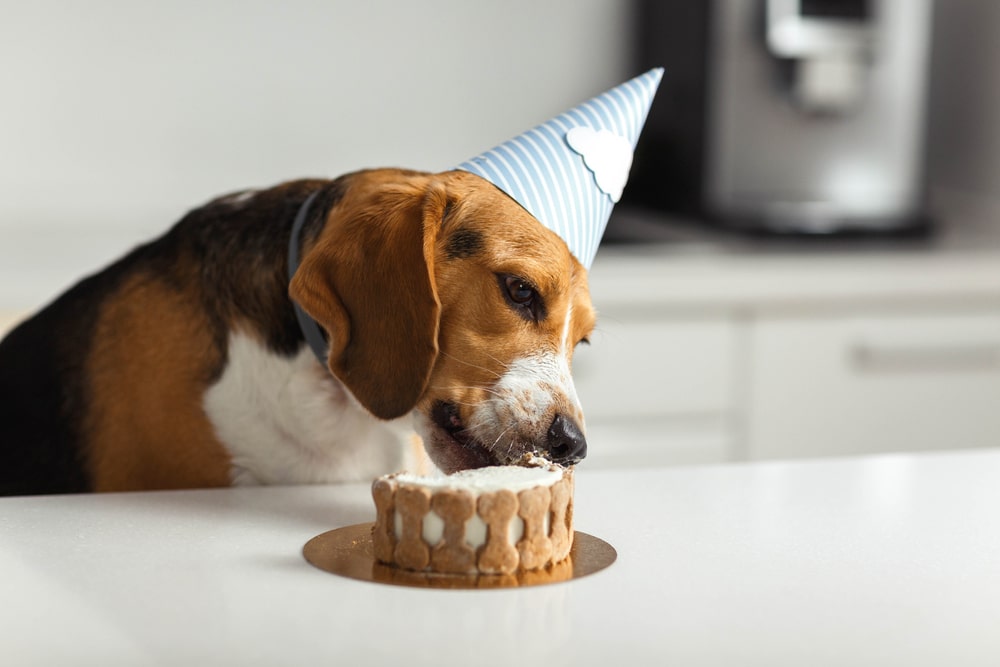Dogs are known for being food-motivated and often beg for table scraps or anything that smells good. Do you ever wonder if sharing your cake with your pup is okay too though? Treating our dogs like family can be tempting, but is it really safe for them to eat cake?
Dogs should not eat cake. Cake is not part of a balanced diet for canines and can actually be quite unhealthy for them. Eating too much cake can lead to weight gain, digestive issues, and even dental problems. The sugary ingredients in the cake can also cause an energy spike followed by an energy crash as well.
Table of Contents
Is Cake Bad For Dogs?
Cake is not toxic to dogs, but it is not a healthy treat for them either. In general, cakes are usually made with ingredients such as butter, sugar, eggs, and flour, all of which are high in fat and can be detrimental to your dog’s digestive system.
Sweet icing may also contain ingredients such as chocolate and xylitol, which are highly toxic to dogs. Most cakes contain sugar too, even if this ingredient is not mentioned in the cake recipe. Ingestion of large amounts can lead to obesity and diabetes as well.
The Unhealthy Side Of Eating Cake
Some potential health risks of giving cake to dogs include the following.
Weight Gain
Eating cake on a regular basis can cause unhealthy weight gain in dogs due to its high calorie and sugar content. Ultimately, it can lead to fat accumulation in the body, leading to weight gain.
Additionally, the type of cake consumed should also be considered. Cakes made with butter- or cream-based frosting are higher in calories than cakes with whipped cream. Eating too much cake also raises cholesterol levels which comes with its own set of health risks.
Digestive Issues
Digestive issues are another concern when it comes to feeding cake to dogs. Excessive sugar and fat can disrupt their digestive system, resulting in things like stomach upset, vomiting, and diarrhea in more serious cases.
Dogs who are fed cake regularly may also experience a decrease in appetite for healthier food items like protein-rich meats or vegetables.
Dental Problems
Dental problems can also be caused by the frequent consumption of sweet treats such as cakes. Moreover, high sugar content leads to the formation of plaque, which eventually leads to tooth decay and periodontitis.
This can lead to painful infections that may require extensive veterinary care or even tooth extraction in severe cases.
Sugary Ingredients And Energy Spikes And Crashes
Cakes often contain sweet ingredients such as sugar, honey, and corn syrup, which can cause an energy spike in dogs. This causes a temporary burst of energy followed by a crash.
When dogs consume these ingredients, their blood sugar levels rise rapidly, leading to increased heart rate, restlessness, and increased thirst. Over time, this can lead to health problems such as diabetes and obesity.
Sugar isn’t the only sweet ingredient in cakes, though. Other popular options include chocolate chips or chunks, cream cheese icing, marshmallow or meringue toppings, and various syrups such as strawberry and caramel.
All of these can affect a dog’s energy levels by increasing blood sugar levels during digestion. While these ingredients are generally safe for humans, they should always be avoided when feeding biscuits to dogs.
One way to minimize the risk of energy spikes and crashes in your dog is to avoid all sugary foods or feed them in moderation.
Go for healthier options like plain yogurt with fruit or mashed bananas with natural peanut butter. Additionally, including high-protein foods in your dog’s diet can help stabilize blood sugar levels between meals and snacks throughout the day.
What To Look Out For If Your Dog Has Eaten Cake
If your dog has eaten cake, it is important to monitor it for any potential signs of illness or discomfort. Depending on the type and amount of cake that was consumed, your dog may experience some digestive issues, such as vomiting or diarrhea.
If the cake contained any ingredients that are toxic to dogs, such as chocolate or raisins, your dog may also exhibit symptoms of poisoning, such as:
- Vomiting
- Diarrhea
- Increased thirst
- Increased urination
- Restlessness
- Seizures
If you are concerned that your dog has eaten cake and is showing any of these symptoms, it is important to contact your veterinarian right away. They will be able to advise you on the best course of action and determine if any treatment is necessary.
Alternatives To Feeding Your Dog Cake

There are many healthy alternatives to feeding your dog cake that can be used as treats or rewards. Some options include the following.
Dog Treats
These are a great alternative to feeding your pup cake. They come in a wide range of flavors, shapes, and sizes, and can be found at most pet stores or online, whether you’re looking for crunchy biscuit-style treats or chewy meat.
Fresh Fruit
Apple slices, bananas, and berries are all safe for dogs to eat and can make a sweet, healthy treat.
Cooked, Plain Meat
Chicken, turkey, and lean beef are all good options. Just be sure to remove any bones and avoid adding any seasonings or sauces.
Fresh Cooked Vegetables
Carrots, green beans, and sweet potatoes are all safe for dogs to eat and can make a healthy, crunchy treat.
Homemade Dog Food (Or Cake)
These recipes are made with all-natural ingredients, such as low-sodium and sugar-free human snacks.
In Conclusion: Can Dogs Eat Cake?
It is not safe for dogs to eat cake. Cakes are not part of a balanced diet for dogs and can be unhealthy for dogs as they are high in sugar, fat, and calories, which can cause your dog to gain weight and have dental and digestive problems.
Also, some cakes contain ingredients such as chocolate and xylitol that are toxic to dogs. It’s best to always give your dog healthy treats and avoid human food if possible.
So, what alternative to cake do you plan on giving your dog? Let us know in the comments below!
